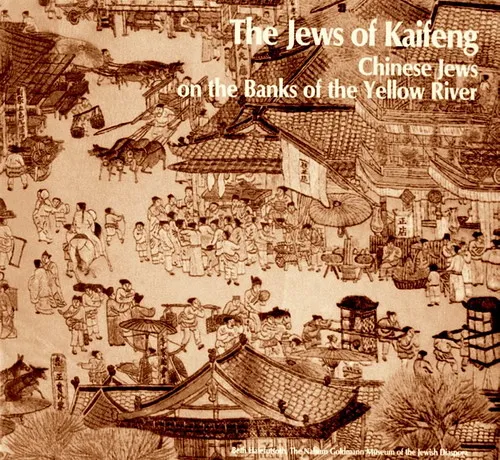Table of Contents
Antonio Graceffo, PhD, China-MBA MBA, is a China economic analyst teaching economics at the American University in Mongolia. He has spent 20 years in Asia and is the author of six books about China. His writing has appeared in The Diplomat, South China Mo.
The Chinese Communist Party (CCP) harbours a fear of China’s smallest religious community, the Kaifeng Jews. Synagogues have been destroyed, community centres closed, and scriptures removed. Neither the religion nor the ethnicity is officially recognized. The CCP appears determined to erase the Jewish identity, including their thousand year history in China.
The Kaifeng Jews are a small Jewish community in Henan Province who arrived from Persia via the Silk Roadduring the Northern Song Dynasty (960-1127 AD). Their community thrived during the Song Dynasty and subsequent dynasties. They built a synagogue in 1163 and maintained Jewish traditions, including observing the Sabbath, dietary laws, and Jewish festivals. At their peak, there may have been as many as 2,500 members. However, as a result of forced intermarriage and assimilation, the community began to lose its distinct identity over several centuries.
By the 19th century, the last rabbi of Kaifeng had died, and the synagogue, destroyed by floods, was not rebuilt. Many Jewish practices had faded away. Displacement and repressive Communist policies against religion nearly caused the community to disappear, with many members absorbed into the Muslim community or the larger Han Chinese society.
Additionally, government surveillance and pressure have made it difficult for members of the community to practice their faith openly or to pass down their traditions to future generations. This repression is part of broader policies targeting religious and ethnic minorities in China, It is aimed at enforcing cultural homogeneity and curbing perceived threats to state control.
In 1954, the Chinese Communist government confiscated the synagogue’s property and built a hospital on the site. Since then, the CCP has even removed an inscribed stone marking the former site of the synagogue.
Today, the Kaifeng Jews are not recognized among the PRC’s 55 official minorities. In 1953, they petitioned Mao Zedong and later Deng Xiaoping for recognition, but their petition was denied due to the Communist government’s fear of foreign interference. Additionally, they were once able to register as “Jewish descendants,” but starting in 1966, they were forced to register as Han Chinese, the predominant ethnicity in China. About 1,000 residents of Kaifeng have ties to Jewish ancestry, while only 40 to 50 individuals are attempting to practice Judaism. These individuals often maintain some cultural practices and a sense of their Jewish heritage, but religious knowledge and observance are limited.
Judaism is not one of the five recognized religions in China (Buddhism, Catholicism, Islam, Protestantism, and Taoism). Only state-approved versions of these five are permitted to maintain places of worship, and they are under extreme restrictions. All texts and liturgy are censored; the sale of uncensored Bibles, including the Torah and Old Testament, is banned. Religious leaders are appointed by the Communist Party. People under 18 are barred from participating in any religious activity. Furthermore, foreign missionaries are forbidden to work in China. All of these factors have made it effectively impossible for the Kaifeng Jews, even with foreign support, to learn about Judaism or pass their traditions on to their children.
Beginning in 2015, as Xi Jinping imposed additional restrictions on religion, the reconnection of the Kaifeng Jews with their Jewish heritage faced significant setbacks. The Kaifeng Jewish school and community centre were closed, and teachers from the Sino Judaic Institute (SJI) were expelled. The community was prohibited from gathering or praying in public. Even in private, gatherings of ten or more people require a permit. Strict laws mandate that all religious activity must be confined to the five recognized religions and only at officially designated houses of worship at scheduled times.
Due to increased pressure and harassment of its workers by police, SJI halted its operations in China. Jews now meet in private homes for worship, but they are monitored by state security and are not even permitted to gather for Shabbat.
Before being shut down by the Chinese government, Shavei Israel, and other charities had been helping Kaifeng Jews reconnect with their Jewish identity, facilitating their travel to Israel for birthright trips, aliyah, or to emigrate to the Jewish homeland. This has proved difficult, however, because under Israeli law, Kaifeng Jews do not automatically qualify as Jews by birth and are required to formally convert to Judaism to obtain citizenship. Some have been able to do the birthright trip, but doing so requires proof that at least one grandparent was Jewish. This proof is difficult for Kaifeng Jews to obtain, given that the Chinese government forces them to record their births as Han Chinese.
Chinese Jews in Israel have to learn Hebrew and attend religious instruction. They struggle with language and culture, but many refer to their life in Israel as returning home. Those young enough serve in the Israel Defense Force (IDF), which is a significant component of integrating into the life and experience of Jews in Israeli culture.
This is first sergeant Abigail Windberg; she immigrated from China and joined the IDF combat unit.
— 🇮🇱 Lea Keisar (@Lea91750) February 7, 2024
The 24-year-old family originally belonged to the Kaifeng community, an ancient Jewish community from the city of Kaifeng in Henan Province, China.
Today, she serves as a liaison in… pic.twitter.com/YNaoo5Tv9U
Staff Sergeant Abigail Windberg, a Kaifeng Jew, is currently serving as an artillery non-commissioned officer in the Israel-Hamas war. In China, her Jewish identity was repressed, and her birth was considered “illegal” because her family had violated the one-child policy. Beijing effectively considered her a non-existent member of an unrecognized ethnicity and religion, barring her from attending public school. After witnessing a bombing while working on a Kibbutz, she decided to join the IDF and serve her new homeland, which she has chosen over China.
A leader of what remains of the Jewish community in Kaifeng explained that many of the young people have gone to Israel. While this helps them connect with their identity and learn about their Jewish culture, religion, and history, it also means that the Kaifeng Jewish culture will die out. Consequently, the CCP will be one step closer to achieving their dream of atheistic Sinicization of the entire country.
This article originally appeared on Mercatornet.com.









